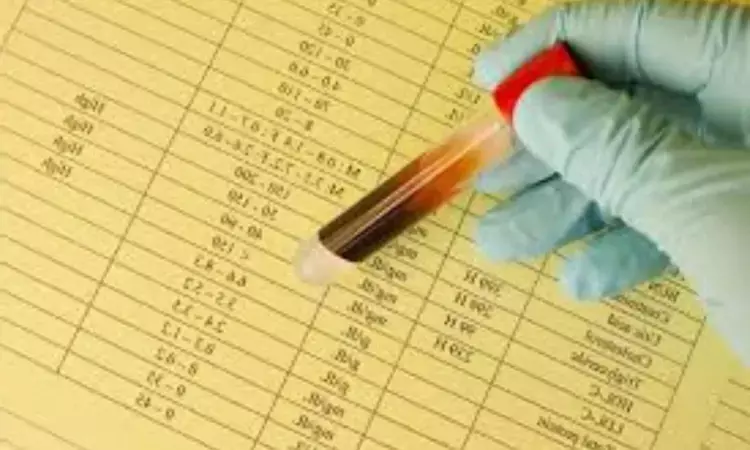- Home
- Medical news & Guidelines
- Anesthesiology
- Cardiology and CTVS
- Critical Care
- Dentistry
- Dermatology
- Diabetes and Endocrinology
- ENT
- Gastroenterology
- Medicine
- Nephrology
- Neurology
- Obstretics-Gynaecology
- Oncology
- Ophthalmology
- Orthopaedics
- Pediatrics-Neonatology
- Psychiatry
- Pulmonology
- Radiology
- Surgery
- Urology
- Laboratory Medicine
- Diet
- Nursing
- Paramedical
- Physiotherapy
- Health news
- Fact Check
- Bone Health Fact Check
- Brain Health Fact Check
- Cancer Related Fact Check
- Child Care Fact Check
- Dental and oral health fact check
- Diabetes and metabolic health fact check
- Diet and Nutrition Fact Check
- Eye and ENT Care Fact Check
- Fitness fact check
- Gut health fact check
- Heart health fact check
- Kidney health fact check
- Medical education fact check
- Men's health fact check
- Respiratory fact check
- Skin and hair care fact check
- Vaccine and Immunization fact check
- Women's health fact check
- AYUSH
- State News
- Andaman and Nicobar Islands
- Andhra Pradesh
- Arunachal Pradesh
- Assam
- Bihar
- Chandigarh
- Chattisgarh
- Dadra and Nagar Haveli
- Daman and Diu
- Delhi
- Goa
- Gujarat
- Haryana
- Himachal Pradesh
- Jammu & Kashmir
- Jharkhand
- Karnataka
- Kerala
- Ladakh
- Lakshadweep
- Madhya Pradesh
- Maharashtra
- Manipur
- Meghalaya
- Mizoram
- Nagaland
- Odisha
- Puducherry
- Punjab
- Rajasthan
- Sikkim
- Tamil Nadu
- Telangana
- Tripura
- Uttar Pradesh
- Uttrakhand
- West Bengal
- Medical Education
- Industry
Critically ill heart failure patients with increased TyG index face greater risk of acute kidney injury

China: An analysis of the MIMIC-IV database has revealed the triglyceride glucose (TyG) index to be a robust and independent predictor of acute kidney injury (AKI) and poor renal outcome in critically ill patients with heart failure (HF). The study findings were published online in Cardiovascular Diabetology on 31 August 2023.
"Our findings indicate that patients with heart failure in a critical condition and increased TyG index face a heightened vulnerability to AKI," the researchers wrote.
The dependable surrogate biomarker TyG index can be used to effectively assess insulin resistance (IR). An elevated TyG index has demonstrated a robust correlation with AKI incidence in various critical care contexts, like contrast-induced AKI. However, there is no clarity on the potential of the TyG index to predict acute kidney injury in critically ill patients with heart failure.
Ningning Ji, Department of Cardiology, Yiwu Central Hospital, Yiwu, Zhejiang, China, and colleagues undertook a retrospective cohort study to examine the prognostic value of the TyG index for AKI in critically ill patients with HF diagnosis.
For this purpose, the researchers non-consecutively selected a cohort of participants from the Medical Information Mart for Intensive Care IV (MIMIC-IV) database. They were divided into quartiles based on their TyG index values. The primary outcome was defined as the incidence of AKI.
The secondary endpoint was determined as in-hospital mortality within both the whole study population and the subset of AKI patients. Renal replacement therapy (RRT) use was also included as a secondary endpoint representing renal outcome (the progression of AKI severity).
The association of the TyG index with the AKI risk in HF patients in critical condition was evaluated using a restricted cubic splines model and Cox proportional hazards models. Kaplan-Meier survival analysis was employed to estimate primary and secondary endpoint disparities across groups differentiated by their TyG index.
The study led to the following findings:
- A total of 1,393 patients were included in the study, with 59% being male. The incidence of AKI was 82.8%.
- Cox proportional hazards analyses revealed a significant association between the TyG index and the incidence of AKI in critically ill patients with HF.
- The restricted cubic splines model illustrated the linear relationship between a higher TyG index and increased risk of AKI in this specific patient population.
- The Kaplan-Meier survival analyses unveiled statistically significant differences in the use of RRT across the subset of AKI patients based on the quartiles of the TyG index.
"Our study expands the applicability of the TyG index to the context of ICU patients with heart failure and establishes that an increased TyG index serves as a predictor and risk stratification tool for acute kidney injury in critically ill patients with HF," the researchers wrote.
"However, further confirmation of causality requires larger prospective studies," they concluded.
Reference:
Yang, Z., Gong, H., Kan, F. et al. Association between the triglyceride glucose (TyG) index and the risk of acute kidney injury in critically ill patients with heart failure: analysis of the MIMIC-IV database. Cardiovasc Diabetol 22, 232 (2023). https://doi.org/10.1186/s12933-023-01971-9
Dr Kamal Kant Kohli-MBBS, DTCD- a chest specialist with more than 30 years of practice and a flair for writing clinical articles, Dr Kamal Kant Kohli joined Medical Dialogues as a Chief Editor of Medical News. Besides writing articles, as an editor, he proofreads and verifies all the medical content published on Medical Dialogues including those coming from journals, studies,medical conferences,guidelines etc. Email: drkohli@medicaldialogues.in. Contact no. 011-43720751


